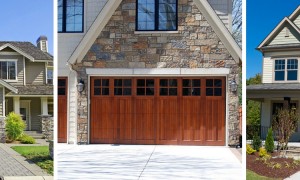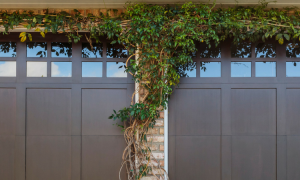Navigating the world of garage doors is tough. Between the dizzying number of prices, designs and sizes, most homeowners feel overwhelmed when shopping for a replacement door. Here’s a quick guide to help you match the perfect garage door to your budget and design needs.
Compare materials
The durability, maintenance and cost of your garage door will depend on its build. The four most popular garage door materials are:
- Aluminum: Aluminum is lightweight and rustproof, but less durable than steel.
- Steel: Steel is sturdier than aluminum, but can rust over time.
- Wood: Veneers can provide the look of wood at a lower cost, but regular maintenance is a must to extend its lifetime.
- Fiberglass: Fiberglass is more durable than both wood and metal, but sometimes cracks.
Check out panel styles
Your garage door should match the style of your entire home. There are a variety of panel styles that will help you match your garage door to the rest of your home. Flush panels are popular for their simplicity. Textured panels complement the outer wall of your home without drawing too much attention.
Keep insulation in mind
An insulated garage door will help you cut your heating and cooling costs. Poorly insulated garages trap hot or cold air against your home. In the summer, trapped air forces your air conditioner to work harder to keep your home cool. In the winter, trapped air lowers your home’s temperature, costing you more in heating bills.
Similar to the insulation in the walls of your home, the insulation value in your garage door is expressed in terms of R-value. The higher the R-value of your garage door, the more energy efficient your garage will be. Polystyrene and polyurethane foam are the most common garage door insulation materials. Polyurethane-insulated garage doors are preferable to polystyrene. Polyurethane is thinner than polystyrene and has a higher R-value — keeping your garage warmer in the winter and cooler in the summer.
Factor in safety
A faulty garage door can cause harm to a family member or your vehicles. Pinch-resistant panels protect fingers, while tamper-resistant bottom brackets reduce the potential for tension-related injury.
Research spring construction
Your garage door’s extension springs control the motion of your door. The springs unwind to raise the door and rewind to close it. While the door is closed, the extension springs feel the full tension of the system. You may want to opt for a door with enclosed springs to prevent damage to the door in the event of a spring failure.
Choose the right motor
Last but not least, don’t forget to ask about the motor powering your garage door. That small motor has the important job of powering the movement of your door. An underpowered motor can give out and send your door crashing to the ground, causing damage to the door and anything in its path. Make sure you choose a motor with the proper horsepower to reliably open and close the door.
Conclusion
There are a lot of considerations when choosing the right garage door for your home. Make sure to factor everything from safety to motor size into your purchase.
Andrea Davis is the editor at HomeAdvisor, which connects homeowners with home improvement professionals in their area for free. Connect with Andrea on Google+







I’ve been looking for a new garage door and was wondering what I should keep in mind. You advised getting a garage door that is designed with safety in mind, as you don’t want any accidents to occur in the garage. I’ll be sure to ask the garage door contractor about that, as I have kids and want to make sure I get a garage door that is easy to control and is one I never have to worry about.